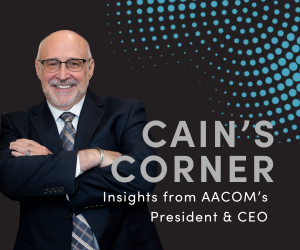Black History Month—A Renewed Importance in 2021
Published February 18, 2021
By Robert A. Cain, DO
2021 Cains Corner
Black History Month arrived this year amid great conflict and tension, yet also great achievement.
Less than two weeks before the first of February, history was made when Kamala Harris was inaugurated as our country’s first woman, first South Asian American and first Black American vice president. That same day, Vice President Harris swore in Georgia’s first Black Senator, Rev. Raphael Warnock.
These hard-won victories required tireless work and dedication by activists and organizers as well as by Black voters who waited in long lines to cast their ballots. These victories became even more important when a violent attack on the US Capitol only two weeks before Inauguration Day threatened to overturn the election results and silence the voice of the people.
These achievements are part of a shared history that can no longer be marginalized or overlooked as we continue this more than 200 years' work-in-progress known as American democracy.
Dr. Carter G. Woodson, along with Black History Month’s fellow originators, recognized the importance of a holistic history, one that is inclusive and complete, one that does not omit the significant contributions made by Black Americans to American society.
The idea of a holistic history should resonate with us as osteopathic physicians. It is at the heart of what we teach our osteopathic medical students. Without an understanding of the interconnectedness of the mind, body and spirit—an attention to the whole—a person cannot realize their full health potential. Without a holistic understanding of our past, and how it led us to our present, we cannot achieve our fullest potential as a nation.
As osteopathic physicians and educators, we see the effects of racism throughout our healthcare system. Inequities have caused people of color to suffer disproportionately from the COVID-19 pandemic and are now contributing to inequitable access to COVID-19 vaccines.
If we re-examine osteopathic medicine’s founding principles and reconnect with its holistic philosophy, they will guide us to the individual contributions we can make, as well as to the larger work we can do collectively, as a profession, to achieve a more equitable, humane and wholly healthy society.
Osteopathic principles and philosophy describe a commitment to holistic care that requires us to be a part of the solution, not only this month, but always.

Robert A. Cain, DO
AACOM President and CEO

